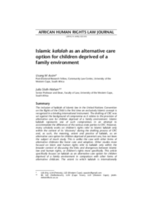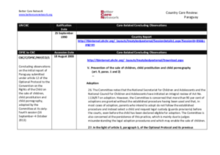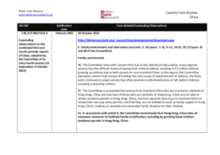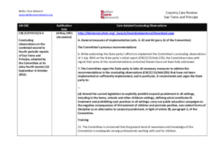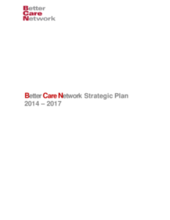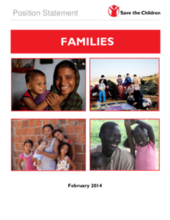Displaying 501 - 510 of 660
This article specifically focuses on kafalah as an alternative care option for children deprived of a family environment in comparison with other forms of alternative childcare.
This country care review includes the care related Concluding Observations adopted by the Committee on the Rights of Persons with Disabilities as part of its examination of Paraguay's initial report adopted by the Committee at its ninth session, as well as other care-related concluding observations, ratification dates, and links to the Universal Periodic Review and Hague Intercountry Adoption Country Profile.
This article reviews a new book by Charles A. Nelson, Nathan A. Fox and Charles H. Zeanah who conducted seminal studies in Romania on children who were institutionalised, comparing their developmental and well-being outcomes to children who were placed in foster care or adoptive families.
This introductory article of a Special Issue of Infant Mental Health Journal on Global Research, Practice, and Policy Issues in the Care of Infants and Young Children at Risk provides a useful overview, placing the articles in the broader contexts of research on institutionalized children and different initiatives to prevent inappropriate care, either through addressing the quality of the care provided or ensuring the appropriateness of the type of care environment provided.
This article uses data collected from adoptive parents’ postadoption and governmental data in Romania, Ukraine, India, Guatemala, and Ethiopia to focus on domestic adoption in each of these countries. The article highlights both promising practices in domestic adoption as well as policies and practices that require additional research.
This country care review includes the Concluding Observations for the Committee on the Rights of the Child and the Committee on the Rights of Persons with Disabilites.
This country care review includes the Concluding Observations for the Committee on the Rights of the Child adopted as part of its examination of Sao Tome's combined second to fourth periodic reports at the 64th Session of the Committee held between 16 September to 4 October 2013.
The aim of this audit was to assess how the Ministry of Gender, Labour and Social Development (MOGLSD) is handling the current adoption process of children leaving in a bid to protect their rights and welfare.
In 2013, Better Care Network (BCN) initiated an important process of developing a new Strategic Plan identifying the main strategic focus for its work over the next four years (2014-2017). The plan is based on an analysis of BCN’s achievements to date, the strategic areas in which BCN can have most impact in the future by working with key actors to strengthen the response to children without adequate family care.
This position statement by Save the Children highlights the central place of families in numerous international legal instruments and how the concept has been understood. It also clarifies its own understanding of families and reviews key provisions under international law regarding their crucial role and responsibilities, and that of States towards them.

